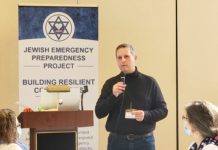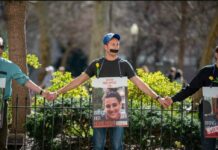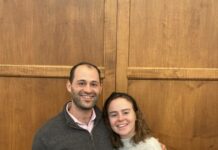Local Jewish leaders don’t know much about the omicron variant just yet. But they say they are ready for it.
Almost two years of dealing with the pandemic has equipped them to handle its ongoing cycle. From COVID in the spring of 2020 to the winter surge last year to the delta variant this past summer, they’ve gotten pretty good at this.
“I’m not panicking,” said Rabbi Ira Budow, head of school at the Abrams Hebrew Academy in Yardley. “We’re still masked in school and carrying on as normal.”
In Abrams, a pre-K-8 school, “the kids are happy,” Budow said. The community even had a Chanukah concert on Dec. 2.
The rabbi said 95% of his staff is vaccinated. Those who aren’t have agreed to regular testing.
Other than masks, the school is operating like normal. And even masks have become routine over the past year. So, as omicron hits U.S. shores, Budow has no immediate plan to change anything.
Abrams’ safety measures are keeping the community safe, according to Budow.
“They’re 98% back to normal,” the rabbi said of his students.
Judy Groner, the head of school at the Perelman Jewish Day School, also said that masks have become normal. Last week, students even wore ones with Chanukah designs.
Groner reopened her pre-K-5 buildings in August 2020. Over a school year-and-a-half, Perelman has seen no COVID case transmissions.
The head of school attributed that to policies that are more cautious than the recommendations of the Centers for Disease Control and Prevention.
Perelman students mask both inside and outside. They only unmask to eat lunch, and they eat lunch outside unless the weather is inclement.
The school staff has a 98% vaccination rate. Any vaccinated Perelman community members who travel abroad must take a test to return to the buildings. Any unvaccinated individuals who travel internationally must quarantine for 7-10 days upon returning.
Like Abrams, Perelman celebrated Chanukah last week. Also like Abrams, Perelman has no plan to change its COVID-era operating procedures.
“It does seem to be working,” Groner said. “Everyone has adjusted.”
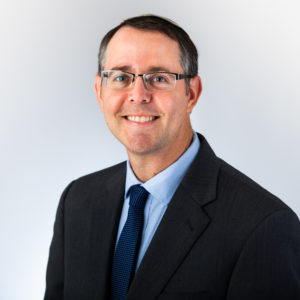
(Photo by Jordan Cassway)
The Jack M. Barrack Hebrew Academy faces a different challenge.
Abrams and Perelman primarily serve pre-K and elementary school kids. Barrack, based in Bryn Mawr, educates students in grades 6-12.
People 12 and up have been eligible for vaccinations since September. So Barrack, led by Head of School Marshall Lesack, has focused on shots.
Getting a COVID vaccine is “part of being a staff member at Barrack,” Lesack said. Vaccination is “highly encouraged” to students, and the “vast majority” are inoculated, Lesack added.
Barrack requires masking, physical distancing and daily health screenings, too. But it has not had to make major changes to those policies since reopening in September 2020.
Lesack is monitoring the omicron news. But it’s “not affecting any change in our policy,” he concluded.
Local synagogues are in a similar position as schools: Nothing really needs to change for now.
Temple Beth Zion-Beth Israel in Center City has returned to in-person congregational life. The only restrictions are that, indoors, BZBI maintains masking and does not yet serve food.
In the spring, the synagogue reopened. For a while thereafter, Rabbi Abe Friedman met regularly with a COVID task force of doctors in the congregation. Now, he just consults them as needed.
After dealing with COVID for nearly two years, BZBI even has its own contact tracing protocol.
Friedman and his staff put member names in a book. When congregants attend services, they put stickers next to their names.
That way, if someone at the service comes down with COVID, everyone knows if they’ve been exposed.
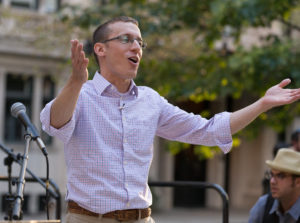
(Courtesy of Temple Beth Zion-Beth Israel)
“This is just what we have to deal with,” Friedman said. “Sometimes it’s this, sometimes the electricity goes out.”
Congregation Kol Emet in Yardley follows similar procedures. Inside, the synagogue requires masking and does not yet serve food. It also maintains physical distancing during services.
Rabbi Anna Boswell-Levy wants to bring food events back, though, by Tu Bishvat in January. Omicron may determine whether that happens. But otherwise, unless it’s more severe than the delta variant, it won’t change much else.
“We don’t have to backtrack if we just keep it conservative and simple to follow,” she said of her pandemic policies.
COVID may not be causing Kol Emet to backtrack, but it is pushing the synagogue to move forward.
Boswell-Levy started offering multiaccess services when the virus first broke out. She has continued offering them because about 50% of attendees now prefer to join online.
Kol Emet also raised money recently for an outdoor sanctuary on its 11-acre property.
“We need to live with it and figure out what changes we need to make in the long term,” she said.
[email protected]; 215-832-0740



